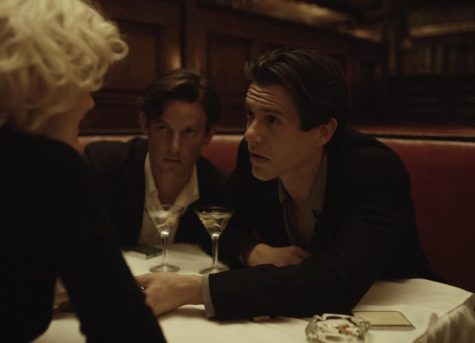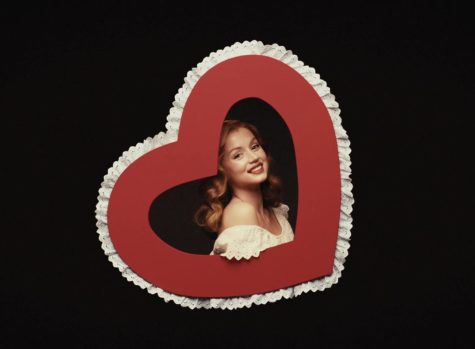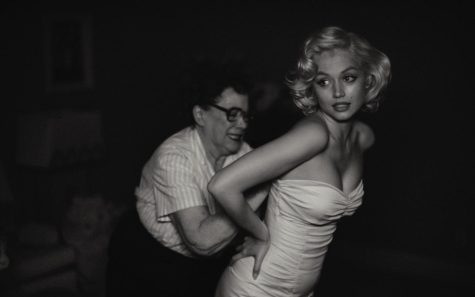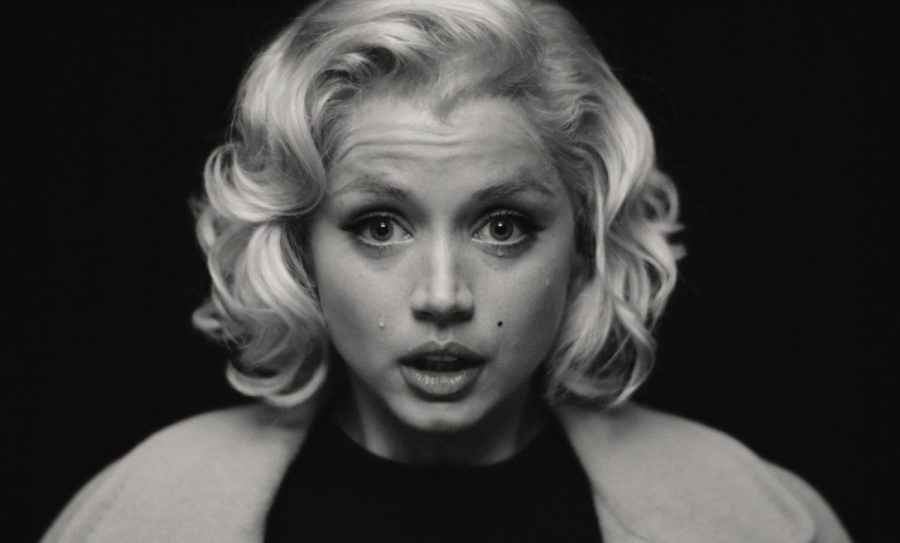“Blonde” is a disrespectful, misogynistic hate film
“Blonde” is the fictionalized biography of Marilyn Monroe (Ana de Armas). The Netflix original directed by Andrew Dominick is not a celebration of Monroe, but an attack on her.
October 12, 2022
Going into “Blonde,” I knew there was a lot of contention surrounding the film. I saw it criticized by critics and casual viewers alike for disrespecting Marilyn Monroe and misrepresenting her and her life.
I watched the 187 minute film for myself, and found it even more disgusting, exploitative and disrespectful than I could have ever expected.
The film, though initially marketing itself as the true behind-the-scenes story of Marilyn Monroe, is actually based on a fictional book of the same name by Joyce Carol Oats. “Blonde” follows Norma Jeane Mortenson (Ana de Armas), later known as Marilyn Monroe, from her adolescent life with her mother to her tragic death as a young woman.
At a young age, Monroe was constantly sad and fearful, neglected and abused by her loved ones. This didn’t change as she got older, as the film shows nothing but Monroe suffering for the rest of her life at the hands of many abusers and her own mind. She lives and dies entirely unhappy, her life nothing but tragedy after tragedy.
There is not a single word that adequately summarizes what this film was, but any negative adjective would be applicable.
This film is not a biography or documentary and can hardly be called a biopic. Almost everything is exaggerated or untrue. While women in Monroe’s time or position may have very well faced the abuses depicted in this film, there is no evidence she ever did. There is no evidence she was in a polyamorous relationship, had an abortion or was sexually exploited to such an extent.

Monroe’s many successes and positive moments were nowhere to be found. It takes away everything she worked hard to achieve. This Marilyn is not allowed to be proud, successful or respected. She is self-hating, her success always tainted by loss and sadness, and any respect she seems to have is false.
The film is a whopping two hours and 47 minutes long, and it felt even longer. Scene after scene of Monroe being exploited, depressed or traumatized for three hours was a complete drag. Not just because of the sad nature of the scenes, but because they’re so exhaustingly repetitive. If you watch 30 minutes of this film, you’ve essentially seen the whole thing.
I have trouble believing that filmmaker Andrew Dominik had anything but malicious or self-satisfying intentions in making “Blonde.” The film reeks of pretentiousness and tries to veil itself under the guise of nonexistent artistic intelligence.
It may be argued that the intent of the film was to show the exploitation and abuse many women inside and out of the industry faced during the period However, it addresses these issues in the most disrespectful, invasive and immoral way possible, only furthering the exploitation it tries to criticize.
It may also be argued that this film was used to highlight that the iconic, bubbly star had much more depth and humanity than we give her credit for, but it fails to show that Monroewas both troubled and triumphant. It paints her as never being anything more than miserable, used, victimized and sick. It takes events from her life that were undoubtedly happy and taints them, arguing that they were all secretly miserable moments beneath the surface.
I struggle to believe Dominik has any respect for Monroe or women in general. This film is undoubtedly extremely misogynistic.
Given an eye-raising NC-17 rating, de Armas is topless or performing sexual acts for at least half of the film. It feels perverse and objectifying, ogling at Monroe’s sexuality while simultaneously shaming it.
In one especially infamous scene, Monroe’s fetus talks to her from inside the womb. It guilts her, begging her not to “kill” it like she did her last pregnancy, despite her previous abortion being non-consensual.

Inserting an anti-choice narrative into a supposedly objective pseudo-biopic is one thing, but it is another level of cruelty to villainize Monroe, a woman who struggled with miscarriages and an ectopic pregnancy, for an abortion she never actually had.
Adding to the misogyny, throughout the entire film, Monroe yearns for her father, who refuses to have contact with her or applaud her success because she is a “whore.”
The few positive moments depicted in Monroe’s life are created at the hands of men. The joys are never her own. Most of these positive moments are when she is having sex or otherwise appealing to a man.
The film has a few positive aspects, though they are few and far in between.
The filmography is, at times, stunning. The filming itself is artistic and experimental, and if any part of me enjoyed this film, it was my eyes. However, as perfectly and beautifully as the film recreates exact snapshots of Monroe’s life, it poisons them by turning every moment that encapsulated her belovedness into moments of tragedy. It feels as if Dominick used Monroe’s life as a tool for his tragic experimental film, a cheap attempt to make “art.”
De Armas gives a stunning, emotional performance, manifesting Monroe as best as possible with the horrible depiction she was given. She portrays grief, anguish, desperation and fear so acutely it grips your heart. Unfortunately, the film’s utter disrespect to its subject taints her performance.
The issue of dramatizing, falsifying and exploiting real lives and histories is not exclusive to “Blonde.” Recently, Netflix released “Dahmer – Monster: The Jeffrey Dahmer Story,” a dramaticized documentary of Jeffrey Dahmer’s life and the impact on his victims. While the show is full of wonderful performances and thoughtful commentary on the many ways Dahmer was protected by his victims’ minority status, it exaggerates and, at times, falsifies the case. It creates false ideas about heinous crimes and only serves to retraumatize victims’ families.
Both “Blonde” and “Dahmer” raise a similar question: when will filmmakers learn that they aren’t entitled to fictionalize real people’s lives, especially with the intention of twisting the truth and hurting them?

This film may have been less deplorable had it focused on a fictional person and didn’t so obviously work to appease men. I want to know why the people who worked on this project hated Monroe so much that they created a film full of lies about her life, reduced her to a victim and sexual object and took away any success or credit she ever had.
The film feels like an act of hatred. It fails to consider that Marilyn Monroe was a person. She was a real person and not an object to flaunt the filmmaker’s “artistry” or to promote some sort of commentary. Monroe was so much more than any abuse or sadness she may have suffered in her life.
If it somehow isn’t clear by now, “Blonde” was terrible. Even with the pleasing filmography, the heinousness of the film drags its rating to a zero. As in, don’t watch it. It was a waste of talent and opportunity. It was a degrading, selfish mockery of a real person and doesn’t deserve anyone’s time.






